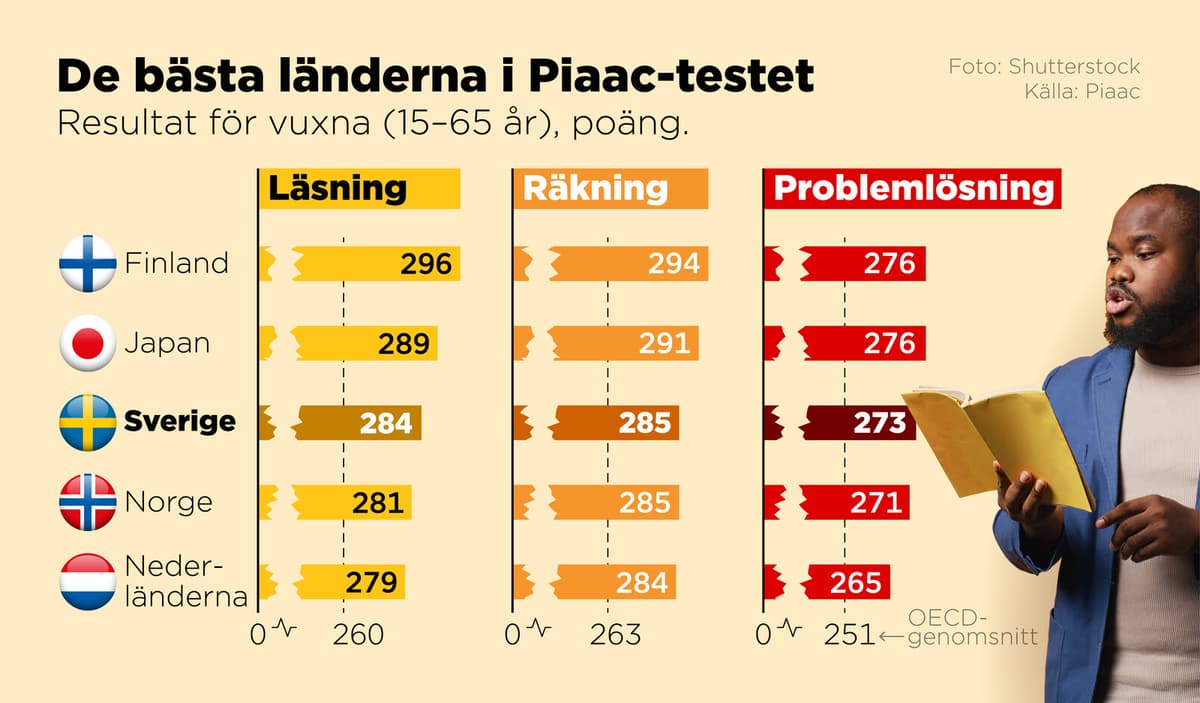In total, 31 countries/regions have investigated adults' skills in reading, arithmetic, and problem-solving. Sweden ranks high: third best in reading skills, shared third place with the Netherlands and Norway in arithmetic, and shared third place with Norway in problem-solving. Finland and Japan are consistently at the top, according to OECD and SCB reports.
Sweden has slightly higher scores in reading and arithmetic now than in 2012, when the Piaac measurement was conducted for the first time. However, the difference lies within the margin of error. The problem-solving section cannot be compared between 2012 and 2023 due to certain updates, but the results were good both then and now.
It's a good result. Sweden is still among the top five countries, says Lotta Larsson, SCB's project leader for Swedish Piaac.
Increased proportion of foreign-born
The Swedish results in reading and arithmetic would have been even better if it weren't for the fact that Sweden has had a large immigration – and thus got a higher proportion who have struggled with the test language to varying degrees.
Despite this, the proportion of those who are very weak in reading and arithmetic has not increased in Sweden. The proportion of high-achievers in reading remains at the same level and increases in arithmetic.
The weakest group, with insufficient skills in all three sub-tests, is significantly smaller in Sweden than among OECD countries: 8 percent compared to 18 percent.
It's clear that we have a larger proportion of foreign-born in the population today. But it's also the case that the education level has generally increased, says Lotta Larsson.
Young adults
There is a strong correlation between education level and performance in Piaac. Early school results also weigh in. Young adults who had high grades from elementary school perform better compared to young adults who had weak grades.
But experience also plays a role. People born between 1989 and 1996 performed significantly better in reading now in their 30s than they did in their 20s. This group (25-34-year-olds) has the highest scores of all in reading and problem-solving, and second-highest in arithmetic.
The weakest performing age group is the youngest, 16-24 years old. SCB notes that in this age group, the proportion with insufficient reading skills has increased from 9 to 15 percent, compared to 2012. The deterioration is most pronounced among foreign-born.
It shows that you need a good foundation from elementary school, and can continue to upper secondary school. And here, it matters how long you've lived in Sweden, says Lotta Larsson.
Piaac stands for Program for the International Assessment of Adult Competences and is initiated by OECD. It has now been conducted twice.
SCB is responsible for the Swedish implementation.
160,000 people born between 1957 and 2006 in 31 countries/regions have participated in Piaac 2023.
In the Swedish part, 3,700 people have participated.
After an information letter, the Swedes who agreed to participate were interviewed and tested during a two-hour home visit. This took place in 2022-2023.
The interview questions deal with, among other things, education and IT use.
Reading, arithmetic, and problem-solving skills are included in the test – skills that are considered necessary in the labor market and in society.
The tests are conducted on a tablet.
Source: SCB
In Piaac's sub-tests in reading and arithmetic, the results are divided into six levels:
Level 0 and 1: Insufficient skills
Level 2: Sufficient skills
Level 3: Good skills
Level 4 and 5: Very good skills
In the problem-solving sub-test, the results are sorted in a similar way, but in five levels: 0 to 4.
Source: IEA/SCB






